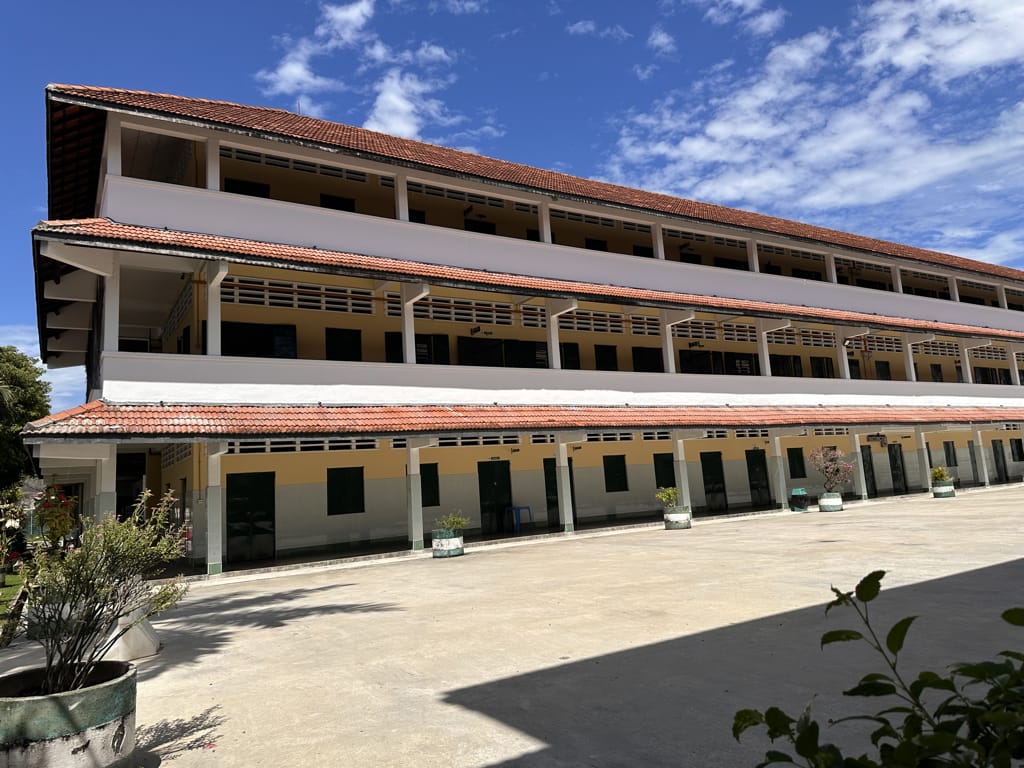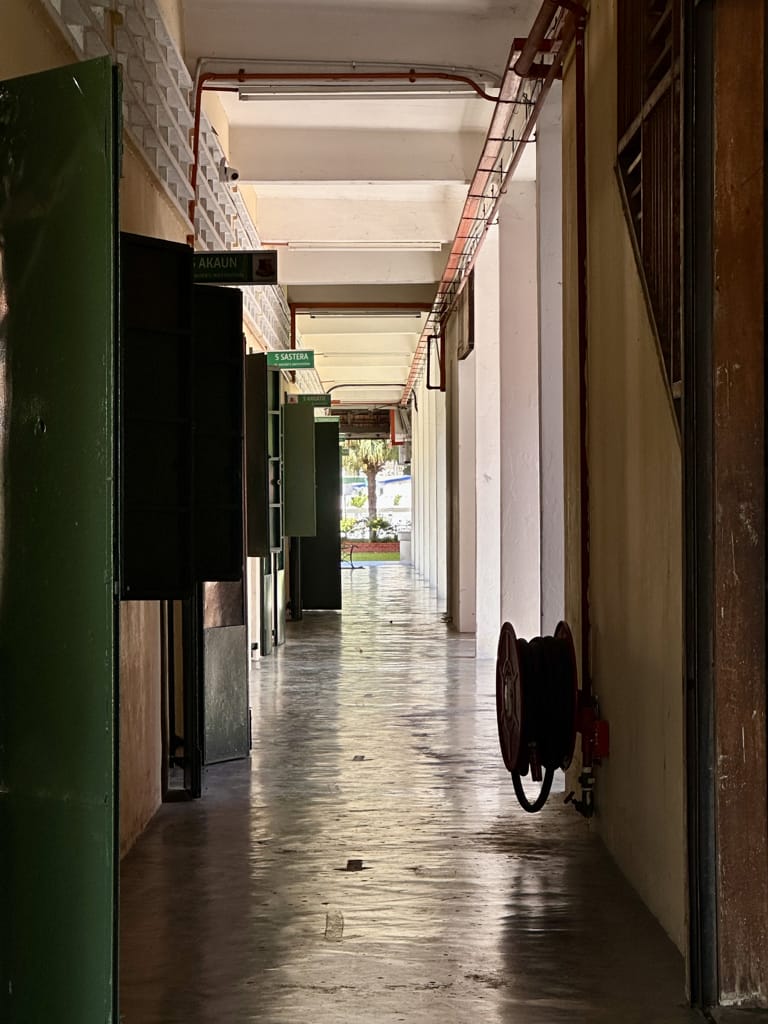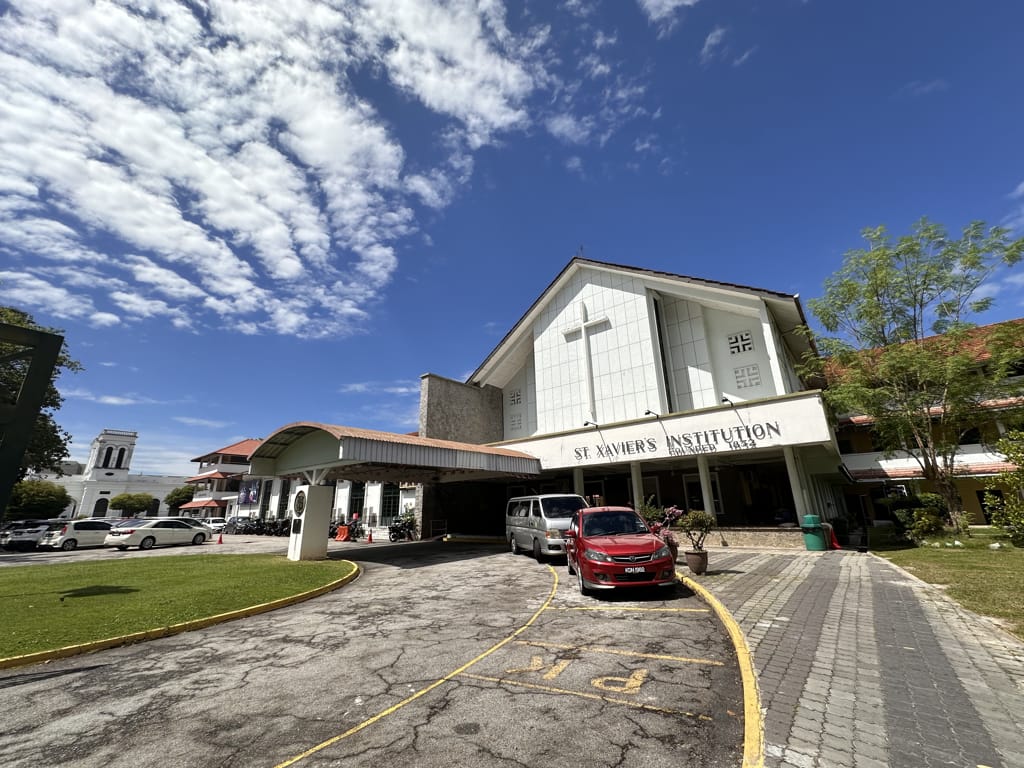How SXI Keeps Enrolment High
By Justin Teoh
August 2024 FEATURE
THE ENROLMENT RATE among Penang’s public high schools is declining,[1] but not in St. Xavier’s Institution (SXI)— the second-oldest school in Malaysia as well as the first Lasallian institution based in Asia. Walking down its bustling corridors one Friday morning, I was greeted by students in brightly coloured co-curricular attires, who smiled as they headed towards the canteen. I was there to talk to brother-director, Jason Blaikie, and board of governors’ chairman, Victor Tan, about what it was that kept SXI afloat. From these interactions, I gained the sense that the answer involved something intrinsic to the culture of this 172-year-old institution.

The Five Guiding Pillars
In their leadership roles, Jason and Victor are tasked with administering maintenance and building projects in SXI, and a large part of the tasks include outreach and fundraising.
However, they do not consider their efforts as marketing strategies as much as they are acts of sharing—presenting noteworthy events and developments to the broader public.
Foregrounding this work, they explained, is what they call the Five Pillars—a set of educational principles that form the ethos of all Xavierians, past and present: quality education, concern for the poor and social justice, inclusivity, respect for all, and faith in the presence of God.
SXI looks beyond examination grades and recognises that intellectual needs differ among students. Towards this end, it maintains the La Salle Learning Centre, where keen students can take advantage of the training provided, such as in woodworking, baking and languages; at the time of writing, the Board is pursuing the implementation of music and technical literacy programmes. “We try to give them options in life,” Jason says, “because we know that not everybody is academically gifted.”
As administrators, Victor and Jason also host fundraising drives with students, paying forward the valuable social services provided by charitable organisations around Penang, such as Cheshire Home and Little Sisters of the Poor. Evoking the enduring legacies of renowned alumni— many of whom the Lasallian institutions gave second chances to when other schools did not—SXI aims to nurture the altruistic spirit that runs in what they call the “Lasallian DNA”.
SXI enrolls students from various primary schools in Penang—national and vernacular—though primarily from George Town. The consequent diversity gives way to an organic sense of camaraderie—one that is blind to racial, ethnic and religious differences. Through cross-cultural interactions in academic activities and breaktime chatter, students imbibe knowledge about what it takes to sustain a tolerant, harmonious community.

Fundraising for the Xavierian Community
While the Five Pillars are not organisational prescriptions per se, the mutual courtesy that they instill among Xavierians is compelling. This is why Victor and Jason share monthly videos about campus happenings to the broader community through YouTube and Facebook, providing publicity about prominent visitations, developments and events that put said courtesy into practice.
“People like what they see,” Jason supposes, “and maybe that has gone around, and that is why parents want to send their kids here [at SXI],” as opposed to private and international schools.
Indeed, parents who can afford the extra premium often select these schools in favour of higher education standards, but for the Board, this is more a needless perception than a necessary reality. Victor reports that SXI is regarded as a high-achieving school based on its strong SPM grades from past years, which substantiates his position that the Five Pillars do develop an “all-rounded education” for its students.
Public school or not, a big threat that consistently looms over student enrolment is the suburbanisation of society, whereby families leave urban areas in search of affordable living options elsewhere. Among other things, not only would longstanding city schools like SXI have to worry about decreases in class size, but also about long-term funding sources. For Victor and Jason, overcoming these hurdles are important because restoring dilapidated parts of SXI’s historic campus is key in sustaining a healthy learning environment. Jason says, “To provide a better all-rounded education, we need to upgrade the hall, the field and the infrastructure.”
He goes on to profess a characteristically Lasallian dilemma: “No money, no mission.” Every cent that they receive goes back to the maintenance of the school, rather than into anyone’s pockets; and every cent is not easy to come by.
Still, the school has to keep going for its students. Besides publicising about SXI’s activities—to work around tight budgets, the monthly videos are outsourced to a video company rather than produced through an in-house editor—the Board regularly brainstorms win-win ways of fundraising. In each meeting, Victor and Jason gather stakeholders, including SXI’s subcommittees, alumni, administration and principal to discuss their observations, plans and action items—all with the shared goal of boosting the institution’s standards. Consequent initiatives typically include alumni dinners, sponsorships, venue hostings and monetary donations.
As they know very well, donations can only come so often and go so far. “After a while, people get tired,” Jason chuckles.
Nevertheless, that did not stop him and Victor from going the extra mile in carrying out the Lasallian mission: providing education to all youths, especially the poor or marginalised.
“All of this is always for the school that we love and for the children entrusted to our care.”
As they continue to work behind the scenes, it matters to them that students receive the learning they need, form fruitful friendships with each other and emerge from SXI prepared for whatever life brings.
Policy Successes and Aspirations
By integrating a principle-based approach with their administrative work as board members, Victor and Jason were able to fundraise priority projects quickly and increase SXI’s student population steadily.
Based on their experiences overall, they suggest that schools adopt two key indicators alongside examination grades and enrolment rates: happiness and attrition rates. To Jason, seeing students greet each other with smiling faces is indicative of well-being and community-building.
Moving forward, they hope that the Ministry of Education (MOE) and the Ministry of Home Affairs can consider a visa policy that would help sustain SXI’s mission as a La Salle school: a short-term education pass where Brothers from other countries can continue providing Lasallian education in Malaysia (read: not converting students into Catholics). Taking cues from the Malaysia Digital Economy Corporation’s (MDEC) digital nomad pass and Singapore’s employment pass, Victor highlights that Jason is the only local Malaysian Brother as well as the youngest. Looking into the future, another Brother must take his place.
Jason adds: “We want the younger Brothers to see what it is like to study in a different country, not spend their life here. Two to three years should be enough, just for them to get the experience.” He mentions Brothers in neighboring countries such as Myanmar, Thailand and the Philippines who are already administering worldwide. “If this goes through, you might be part of history now,” he jokes to me.
Footnote
[1] See Penang’s Evolving School Preferences (page 16).
Justin Teoh

recently graduated from UNC Chapel Hill with majors in comparative literature and public policy. You can find him sharing music finds and food pictures on Instagram at @justinteoh_.



